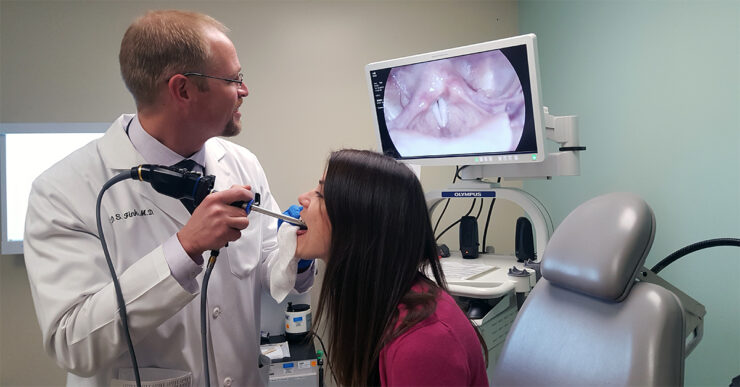Hoarseness is also called Dysphonia. Have you ever felt clumpiness in your throat? Does your voice sound husky, heavy, or rough? You might have hoarseness of your throat. You might have waved it away assuming it to be a result of talking out too loud. But there might be an underlying medical reason for this abnormal condition. If it is not a medical condition, it should go away eventually but if you observe the same symptoms for three or more weeks, there is something severe you should be fearing.
ENT Specialists Dr Jeeve, Dr Hobbs and Dr Annabelle from www.entclinic.sg in Singapore share the importance of the dynamic examination of the voice box and allows the surgeon to identify conditions such as vocal cord cysts.
Having said so, let’s take a look at what hoarseness is and a more in-depth analysis of what causes it.
What is hoarseness?
Hoarseness, otherwise referred to as dysphonia, is an underlying medical condition that causes your voice to go strained, breathy, or raspy at times. Your once smooth voice may go high or low pitched. There are various reasons why hoarseness occurs. However, most of the time, it is not serious. But if you neglect it for a longer duration of time, it may snow ball into something even more severe.
What are the causes of hoarseness?

General irritation, any kind of injury, flu or infection of the vocal cords can cause hoarseness. The larynx, which is also called voice box, is a part of the respiratory tract that consists of vocal cords. The outer wall of this larynx is called Adams apple. When there is stress laid on the vocal cord while singing or singing, vocal cords vibrate to produce sound.
While there are several reasons behind hoarseness, common causes include acute laryngitis, upper respiratory tract infection, and overuse of voice.
- Cysts or polyps, which are caused by infectious diseases on the vocal cord, can also cause hoarseness of your voice.
- If your voice is stressed due to repeated activities on the vocal cord, it can cause vocal cord paralysis that in turn results in hoarseness.
- Extreme gastroesophageal reflux lays more than enough stress on the vocal cord that causes hoarseness.
- Unexplained and unidentifiable allergies cause hoarseness of your voice.
- Sometimes, irritants cause your respiratory tract to get infected and accelerate the problem to cause hoarseness.
- Excessive smoking and tobacco habits too cause hoarseness of your voice.
How hoarseness is diagnosed?
Anyone can be diagnosed with hoarseness irrespective of their age. If you feel any discomfort on your vocal cords, have difficulty in speaking or cause stress on your throat then visit your nearest healthcare centre and get an appointment with an otolaryngologist/ ENT specialist.
Based on your past medical records and current medications, your ENT might ask a few questions that will help them understand the main cause of hoarseness. Your ENT will check for swellings on your neck and examine your throat and vocal cords. After proper diagnosis of your voice box, throat and neck the ENT will prescribe medications to treat your hoarseness.
What is Laryngeal videostroboscopy?

Laryngeal videostroboscopy helps the doctors view the vocal cords and their vibration patterns. Vocal cords usually vibrate at a faster pace that is not easily visible to the human eye. An average male vocal cord vibrates at 100-130 times per second, where as it is 190-220 times per second in females.
In this process, a light strobe used to create images that replicates the fast-paced vibration in slow motion. This process, thus, helps doctors assess the quality of vibrations in the vocal cords. It also helps them to identify any problems in the functioning of the vocal cords.
How can laryngeal videostroboscopy help treat vocal cord cysts and hoarseness?

Laryngeal videostroboscopy is not a comprehensive treatment for hoarseness or vocal cord cysts. It just helps doctors assess and evaluate the health of the throat and its functionality. It helps doctors to diagnose the underlying medical condition so that they can better understand the patient’s condition and take appropriate clinical steps for the betterment of patient’s condition.
- Laryngeal videostroboscopy determines the reason behind hoarseness, vocal cysts, and voice dysfunction.
- It helps doctors to visualize patient’s vocal cords. It further helps them to clearly see the vocal cords of the patient. Hence, they can particularly understand the underlying medical issues if any.
- It helps clinicians understand the functionality of vocal cords as well as the voice box of the patients. If there are any underlying medical issues with the same, they can easily and quickly find them out and start the treatment immediately.
- It helps clinicians to detect and identify vocal cord lesions or any form of irregularities like inflammation, muscle tension, or scars on the tissue.
- To assess and evaluate the health condition of your throat that causes problems for you while swallowing, talking, or singing.
Conclusion
Hoarseness of voice is not a serious condition at all in any case. The causes behind the same too are very mild and minor. The symptoms usually range from a minimum of three or more weeks. And it gets cured automatically most of the time. So, you don’t have to panic. But if you neglect it and ignore medical treatment, it may spiral into something more severe. Hence, due care is required but there is no need to panic whatsoever.




























